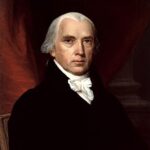The Embargo Non-Intercourse Acts Decision
James Madison inherited Jefferson’s disastrous Embargo Act in 1809. The policy banned all American trade with European nations. Madison replaced it with the Non-Intercourse Act, targeting only Britain and France. This economic warfare strategy aimed to force European powers to respect American neutrality. The Napoleonic Wars had created dangerous conditions for American shipping. Both Britain and France regularly seized American vessels and cargo.
Economic Warfare Strategy
💰 The Non-Intercourse Act prohibited trade with America’s largest trading partners. Madison believed economic pressure would succeed where diplomacy had failed. American merchants could still trade with other nations legally. However, enforcement proved nearly impossible along the vast American coastline. Smuggling became rampant as traders ignored the restrictions.
Immediate Consequences
📊 American exports plummeted from $108 million to $22 million between 1807-1808. New England’s economy collapsed as shipping industries shut down. Agricultural prices fell drastically without European export markets. ⚠️ Regional opposition grew strongest in Federalist strongholds. The policy created more economic hardship than diplomatic success.
Impact:
Economic Devastation
📉 The Embargo Non-Intercourse Acts created widespread economic catastrophe across America. Unemployment soared in port cities from Boston to Charleston. Agricultural communities lost their primary export markets overnight. Farmers couldn’t sell surplus crops, leading to widespread bankruptcy. The federal government lost crucial tariff revenue from reduced trade. Regional economies dependent on maritime commerce faced complete collapse.
Political Consequences
🔥 Madison faced fierce opposition from Federalists and even some Republicans. New England considered secession as their economy crumbled. The Hartford Convention emerged partly from anger over trade restrictions. Congressional elections showed growing anti-administration sentiment. Madison’s popularity plummeted as economic hardship spread nationwide.
International Failure
🌍 Britain and France largely ignored American trade restrictions. Both nations found alternative markets and suppliers easily. The policy failed to change European behavior toward American shipping. Instead, it weakened America’s negotiating position internationally. The restrictions made America appear economically desperate rather than diplomatically strong. This contributed to rising tensions that eventually led to the War of 1812.
